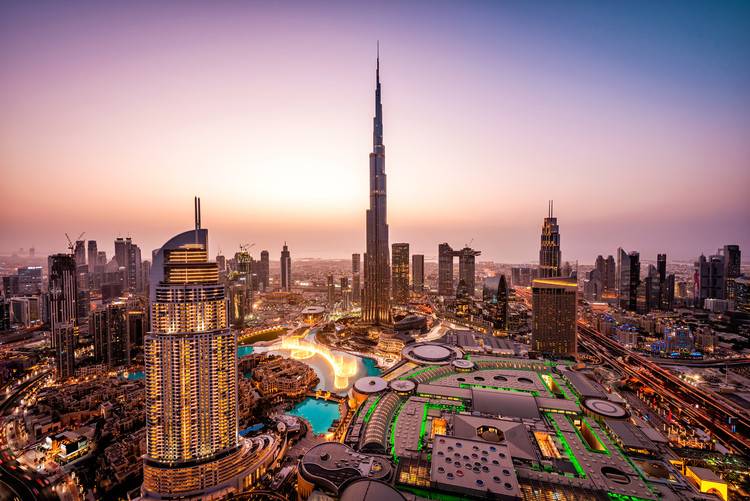The report anticipates a non-oil GDP growth of 5.9 percent in 2023 and 4.7 percent in the following year, while estimating the oil GDP growth at 8.1 percent in 2024….reports Asian Lite News
The Central Bank of the UAE (CBUAE) has raised its forecast for the Gross Domestic Product (GDP) growth for the UAE in the coming year, 2024, to 5.7 percent, compared to its previous projection of 4.3 percent.
The bank stated in a report that the overall GDP for the country is expected to grow by 3.1 percent in the current year, 2023.
The report anticipates a non-oil GDP growth of 5.9 percent in 2023 and 4.7 percent in the following year, while estimating the oil GDP growth at 8.1 percent in 2024.
The Central Bank clarified that the UAE economy recorded a 3.8 percent year-on-year (YoY) growth in the second quarter of the current year, compared to 8 percent recorded in the same period last year, aligning similarly with the first quarter of the current year.
It mentioned that the non-oil GDP growth accelerated to 7.3 percent YoY in the second quarter of the current year, up from 4.5 percent YoY in the previous quarter and 6.4 percent YoY compared to the same period last year.
Regarding the non-oil sectors of the economy, the report highlighted significant expansions in financial services, insurance, construction, wholesale, and retail trade, leading to an adjustment in the expected growth rate for 2023 and 2024 to 5.9 percent and 4.7 percent, respectively.
It stated that the unified financial surplus during the first half of the current year amounted to AED 47.4 billion, or 5.2 percent of the GDP, compared to a surplus of 13.4 percent during the same period in 2022.
According to the report, government revenues reached AED 246.9 billion, constituting 26.4 percent of the GDP on an annual basis during the first half of 2023. Meanwhile, total expenditures amounted to AED 199.5 billion, accounting for 21.3 percent of the GDP on an annual basis.
The Central Bank’s report highlighted the continued robustness of non-oil private sector economic activity. The Purchasing Managers’ Index (PMI) for the UAE surged to 57.7 in October, marking its highest level since June 2019. The improvement in working conditions was propelled by a sharp rise in both business activity and new orders, particularly in new export orders, growing at the fastest pace in over four years.
The report indicated that the PMI data generally signalled strong growth in the non-oil sector in the third quarter and in October. Companies remained optimistic about expectations over the next twelve months.
The report also noted an increase in Dubai’s PMI to its highest level since August 2022, reaching 57.4 in October. The substantial increase in new orders, expanding at the fastest pace since mid-2019, was the primary driver for the overall increase, boosting business confidence to its highest level in over three years.
It clarified that in line with the economic activity’s resilience, private-sector employment continued to expand rapidly. The number of employees in this sector in September reached a 5.5 percent higher ratio than the previous year, with total wages in the private sector rising by 8.2 percent annually.
The influential PMI survey pointed to increased employment in the UAE to meet the strong surge in new orders at the end of the current year’s third quarter and into October.
Resilient Growth in Key Sectors
The CBUAE has said that despite the continuing global uncertainty and tight monetary stances worldwide, the UAE real estate sector continued its good performance in the period from July to October 2023.
The Central Bank, in its quarterly economic review 2023, explained that in the first nine months of 2023, the value of residential transactions in Abu Dhabi increased by 56 percent year-on-year (YoY) to AED 67.8 billion. According to REIDIN, the average sales price of residential properties in Abu Dhabi registered a 3.2 percent increase in Q3, 2023 compared to the same period a year ago.
In October 2023, sales price growth accelerated to 3.9 percent YoY. Average rent continued its upward trend, marking a YoY increase of 0.8 percent and 2.6 percent in the third quarter and October 2023, respectively, after an increase by 0.5 percent YoY in Q2 2023. This resulted in an average rental yield of 6.2 percent in Q3 2023, broadly unchanged compared to 6.3 percent in October.
Additionally, the report pointed out based on Dubai Land Department (DLD) data during the first 10 months of the year, the value of real estate transactions in Dubai surged by 37 percent YoY, surpassing AED 500 billion. The volume of real estate transactions conducted in the initial three quarters of the year increased by 36 percent YoY accounting for more than 116,000 transactions.
The number of new investors in the Dubai’s real estate market increased by 15 percent YoY in the first three quarters of 2023, compared to that of 2022. Average residential property sale price in Dubai increased on average by 0.3 percent YoY in Q3 2023. Average rent increased by 12 percent YoY in Q3 2023, decelerating to 5.7 percent YoY in October. This resulted in an average rental yield of 8.8 percent in Q3 2023, broadly unchanged with respect to the 8.7 percent registered in October.
Regarding tourism and hospitality, the report mentioned that the UAE has initiated the National Tourism Strategy 2031, part of the “Projects of the 50” aiming to establish itself as a top global tourism destination by 2031. The plan targets to raise the tourism sector contribution to GDP by AED 450 billion in addition to attracting investments worth AED 100 billion and hosting 40 million hotel guests annually by 2031.
In the first eight months of 2023, the Abu Dhabi’s hospitality sector performed strongly. The CBUAE report stated the first three quarters of 2023 data indicate that Dubai continues to be a prominent hub for global tourism.
ALSO READ: Investopia UAE-India: New Edition Aims to Boost Investments

Leave a Reply